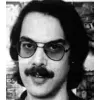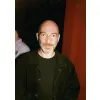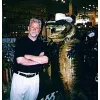SID - The Rock 'n Roll Years
Written by Chris Abbott, originally published in Edge's first
RetroMagazine, September 2003. The remit was to look at the working conditions and climate that the musicians were working under in the 1980s, and drawing a parallel with the early days of Rock 'n Roll.
They don't make legends like they used to. Game music, like pop, is now a disposable commodity. Necessarily formulaic, compromised by accountants, evaluated by clueless executives, and ripped apart by demographics.
Yet a band of pioneers once changed game music forever: from tinkly infant-jingles to mature soundtracks. Game music, briefly, was the new Rock 'n Roll. Fans bought games for their music. Terrible games sold for their soundtrack. These musicians had fun. They made the rules. They were interviewed as gods. Then like most Rock gods, they were quietly forgotten.
Yet a band of pioneers once changed game music forever: from tinkly infant-jingles to mature soundtracks. Game music, briefly, was the new Rock 'n Roll. Fans bought games for their music. Terrible games sold for their soundtrack. These musicians had fun. They made the rules. They were interviewed as gods. Then like most Rock gods, they were quietly forgotten.
Rock 'n Roll Hardware: sound chip as performance instrument.
Rock 'n Roll's growth was made possible by the electric guitar: a sound instantly recognisable and anarchic. The
electric guitarof the time was the Commodore 64 Sound chip (MOS6581 Sound Interface Device, or SID). Its eccentric engineering and obscure features were out of place in a machine intended for business. This was, ironically, a by-product of corporate thinking:
they thought that they were adding such esoteric capabilities - in the name of along feature list
for Jack Tramiel - that no-one would ever use all those things to the fullest, so they never debugged them- Martin Galway
This was hardware that could justifiably be called an instrument, and which began to attract attention from the technical music press. More importantly, it began to attract musicians. They came for the hardware, but they stayed for the opportunity to tap a new infant art form.
The earliest convert was Fred Gray, originally hired as Imagine's in-house music man, and master of the bouncy tune. His bouncy melodies and later the happy soundtracks of David Dunn were rare examples of game music being treated as more than an afterthought, though serious electronic pieces such as Fred's later work were still some way off.
That all changed in 1985, when game music discovered its twin deities: Rob Hubbard and Martin Galway.
Martin had been established at Ocean since 1984, but Rob's entry into the scene reinforced Martin's conviction that game music was an art form:
The earliest convert was Fred Gray, originally hired as Imagine's in-house music man, and master of the bouncy tune. His bouncy melodies and later the happy soundtracks of David Dunn were rare examples of game music being treated as more than an afterthought, though serious electronic pieces such as Fred's later work were still some way off.
That all changed in 1985, when game music discovered its twin deities: Rob Hubbard and Martin Galway.
Martin had been established at Ocean since 1984, but Rob's entry into the scene reinforced Martin's conviction that game music was an art form:
At that time I realised I had some competition. I thought I was the only one taking it seriously.- Martin Galway
Rob's entry into computer music was as driven by the same conviction that computer music was ripe for revolution:
Originally I viewed game music as simply dire - wrong notes all over the place and simply bad musically. That's why I started: I thought I could at least get the notes right! I didn't think of it as pioneering. We simply got on with it and had a lot of fun doing it. Yes it was also additional income to help pay the bills too.- Rob Hubbard
Rob underplays the impact he had. He changed the rules. Thing on a Spring (for which he was apparently only paid £25!) and Monty on the Run (first computer violin and guitar solos) were so well received that he imbued the job of
freelance musicianwith the sort of acclaim real Rock 'n Rollers become addicted to.
Everyone else at the time were school kids except Rob. He was a great experimentalist.- Ben Daglish
I hadn't heard of any musicians until Pete Stone at Palace played me Rob Hubbard's Monty On The Run and saidmake it like that
!- Richard Joseph (not a school kid at the time!)
I didn't know of ANY other computer musicians until 1985/6, when I first heard Galway and Hubbard music, which really impressed me, as they were doing stuff much better that my simplistic fare. I then immediately realised that I had to pull my socks up - and started to do better…- David Whittaker
If Rob was the groundbreaking Elvis of the scene, then Buddy Holly was Martin Galway: his music was more studious, introverted and technical: though his sales technique was surprisingly sophisticated:
In March of 1984 I was doing the audio for this BBC Pac-man rip-off that my school friend Paul Proctor was programming and we agreed that if I could sell it, we would split the money. I looked on the back cover ofPersonal Computer Weekly
and there was an Ocean ad for Kong, I think. Since they were in Manchester I gave them a call. Once we got to Ocean, they bought the game easy enough, and so like any salesman I delved into my pocket for the number #2 product. I played my BBC tunes on their system there and they liked 'em, but David Collier said (in his thick Lancashire accent),There's no market for 't BBC round 'ere lad, what d'yer know about the Commodore 64?
. I said I didn't know much but I could try, so they loaned me (without any contracts) a complete CBM64 assembly language development system to take home and mess with. - Martin Galway
Where Rob's music was busy, Martin's was measured, trancey and abstract. When
Hypersports, and later
Ramboappeared, he was elevated to Rock God along with Rob. The adulation soon spread…
I had a lot of publicity in magazines. On several occasions I got spotted in WH Smiths looking at the mags. You don't get that now folks! They don't want individuals to be stars. Just the name of the publisher, and a list of as many credits as they can fit in the manual.- Richard Joseph
Occupational Hazards: digging the dirt!
The 8-bit era is primarily remembered as a fun place to be. Of course, there were occupational hazards:
There were a couple of peculiar set-ups - Mirrorsoft being an example, in the heyday of Robert Maxwell. I seem to recall we had problems getting paid…though we got tickets to the 'Biggles' premiere from them!- Ben Daglish
Robert Maxwell fell off his boat to his death, leaving Mirrorsoft owing me £1000 (which I never got) - the fuckers !- Dave Whittaker
However, despite the cowboy nature of the time, the big names seemed to be well-treated: they were well-known and even budget games companies recognised that a game was naked without a soundtrack from one of them.
Companies were less likely to rip off the programmers because they were valuable commodities.- Ben Daglish.
However, if you weren't a big-name composer, things were less rosy:
I suppose all my stuff has been freelance… given the money I got, this should actually just read free!!- David Hanlon (ex-Bullfrog), composer of cult classic tunes
Druidand
Enlightenment - Druid 2
If there are more lurid stories from the time, they weren't revealed to this interviewer, though one can only guess at the Rock 'n Roll memories hidden in an alcoholic haze:
One day in London with Stoat and Tim…..I can't remember the rest since I was completely drunk!- Rob Hubbard
Once I had 3 days non-stop (and I mean non-stop) drinking in Glasgow with Tony Crowther & Dave Whittaker at a wedding. Nothing *particularly* eventful happened - its just a haze of pubs / clubs / beer / women / Dave's flash car & flash suit.- Ben Daglish
When I was a games musician I used to drink white wine by the pint - my colleagues would often encourage me - that was until one New Year's Eve party when I had about 6! I pebble dashed someone's bathroom! To who ever it was who threw the party… sorry dude!- Fred Gray
It's very difficult to do anything pissed - that is unless you work at it!!!- Rob Hubbard, putting the record straight about his supposedly being pissed while programming the (badly received) music to the Martech licence disaster
Geoff Capes Strongman.
Work or play?
It was a 'job', but certainly not a 'real job' like what real people do - we were having too much fun. There *was* a certain amount of pioneer feeling to it though - at the time when there were only a few full time computer musos in the country, it seemed very leading edge. And we were mixing with people that were pushing back the boundaries of technology / coding - sprites-in-the-border being a famous example on the C64.- Ben Daglish
To natural performers like Ben Daglish, freelance game musician was a way of life. Not content with selling music, he also produced demos with long-time friend Tony Crowther for distribution on the legendary C64-only BBS Compunet. It was Ben who was responsible for one of the most humorous piss-takes of the time: the Chicken Song story.
The extensive Zzap!64 magazine coverage played a very large part in creating the legends, and attracted wannabes to the composers. Rob Hubbard later bitterly regretted putting his phone number into a promotional demo that later found its way to Compunet.
One of the most persistent of these was Barry Leitch, who started off his music career with some truly awe-inspiringly dreadful versions of the Chicken Song and the Eastenders theme. The story would have ended there if he hadn't been continually phoning up the composers to bother them. When Ben Daglish heard the Chicken Song, he swung into action and cajoled Rob Hubbard and Dave Whittaker to produce piss-takes of Barry's chicken song version. Rob even threw in the Eastenders theme and
The extensive Zzap!64 magazine coverage played a very large part in creating the legends, and attracted wannabes to the composers. Rob Hubbard later bitterly regretted putting his phone number into a promotional demo that later found its way to Compunet.
One of the most persistent of these was Barry Leitch, who started off his music career with some truly awe-inspiringly dreadful versions of the Chicken Song and the Eastenders theme. The story would have ended there if he hadn't been continually phoning up the composers to bother them. When Ben Daglish heard the Chicken Song, he swung into action and cajoled Rob Hubbard and Dave Whittaker to produce piss-takes of Barry's chicken song version. Rob even threw in the Eastenders theme and
The Power of Love too, each worse than the last. Ben and Tony even came up with alternative lyrics. Musical jokes have a fine tradition, but this one was surprisingly public!
Footnote: Barry took it on the chin, overcame this early humiliation and later became a respected composer and sound technician, and is relieved people didn't hold it against him.
But it wasn't just the musicians who had fun. The 8-bit world was full of jokers: and unlike today's Easter Eggs in programs, the jokes were often surprisingly high profile:
Steve Cain had designed a game which he had to write an intro for… it was sci-fi of course and he invented lots of wonderful acronyms which spelled out swear words like SHIT and such like - nobody noticed and it was published with the original text he wrote!- Fred Gray
But some pranks never change…
Firebird Software (Telecomsoft) was the main firm I worked for in those days, and it was a great place! Every time I went there to show them the latest progress with whatever project I was working on at the time, we all ended up getting riotously slaughtered in the pub across the road. One night me and Colin sneaked back into the Firebird office in the middle of the evening and rearranged the furniture, put all the desks on the chairs and the phones on the floor. Unfortunately Colin was late getting to work the next morning (owing to a hangover!) and the people who arrived before he got there to explain through the place had been burgled until they realised nothing had been taken…!- Dave
UbikKorn, author of
Ubik's Music
And as for the rumour of the highly paid programmer who spent most of the day looking in to peoples apartments with his binoculars and blatantly looking for women undressing, well, that remains a rumour!
A quick buck
In the halcyon days of 1986, games could be very quick to produce, and could mostly be done by one or two people. That went double for the music. These quickdraw musicians were legendary for their ability to turn jobs round in timescales that would barely cover one product meeting today. In these circles, time had a different meaning.
Certainly there were a couple of tunes that I did overnight. As to the longest…that probably was Trap - it was ages before I was happy with it - coupla weeks, at least.- Ben Daglish, redefining the word
ages
Rimrunner. It took about half an hour.- Richard Joseph
But the King of the quick knock-off was David Whittaker:
I know that I've done tunes in just a few minutes (as they were so short, in those days).- David Whittaker
Even the perfectionists could pull it out of the bag when the need arose:
There is an interesting story behind Commando. I went down to Elite's offices and started working on it late at night, and worked on it through the night. I took one listen to the original arcade version and started working on the c64 version. I think they wanted some resemblance to the arcade version, but I just did what I wanted to do. By the time everyone arrived at 8.00am in the morning, I had loaded the main tune on every C64 in the building! I got my cheque and was on a train home by 10.00 am…- Rob Hubbard
And in the right mood, some notoriously pedantic composers could pull it out of the bag on occasions:
I remember composing Black Lamp overnight. I had to have it finished for the following day. I took my work equipment home because I'd sat at work all day staring at a blank screen. I only had the tune idea at about 10 'o clock in the evening, and sat up all night in my bedroom writing it. It sounds like it if you listen to it!- Tim Follin
Some composers were more resourceful in beating composer's block:
I did have a few dry spells, where I couldn't come up with anything - so I would usually borrow ideas from others (i.e. plagiarise) and even from myself. One example was Red Max, which is my rip-off of Rob's Commando - but more of an homage really.- David Whittaker.
An easy living from your bedroom
I worked in the wee small hours in a tiny bedroom. I wrote a jazz piece once called 4am - yes you guessed it, I wrote it at 4am as was the case with most of the game music. The best part were all the snazzy cars that arrived outside my door - Porsches and the like - I think the neighbours thought I was a Drug Baron!- Fred Gray
Though game music did not pay Drug Baron wages, it was a good living:
For the first few years it just got better and better. It got to a point where I was earning money that made my successful music biz friends green with envy. Then somewhere in the middle nineties people started arriving in the games industry straight from college and the fees plummeted. It's been a slow journey back….- Richard Joseph
It had also been an escape from the many worse ways to earn a living at the time:
I was living very cheap and making a decent living for a gigging musician, but it was never going to be enough to make real long term plans, like house buying, holidays etc. I had been doing lots of gigs and the change was very welcome indeed - and also extremely stimulating.- Rob Hubbard
But underlying it all was the same insecurity behind all the great Rock 'n roll stars: that it would all end as quickly as it had begun.
We all worked 16 hour days 7 days a week. After all, it was hard to turn down any work.- Rob Hubbard
I felt that anyone could come along and take my job. It was conditioning from my music industry days. I wasn't worried about my contemporaries- they were all tied to major companies so there was no threat there- but I was always wary of newcomers. I would address the problem by hiring certain of them to do conversions of my work to other formats. In that way I made allies rather than rivals.- Richard Joseph
At the time I was glad of the hard earned money. All the time I was writing for games I lived on a council estate - I never ever saw it as glamorous - John Heep at Dentons told me I had won an award once for some Spectrum music I wrote - I just saidoh
, and carried on with what I was doing. If anyone knows what it was then please let me know!- Fred Gray
Mutton dressed as lamb
Just as Elvis was too talented for some of the crap they made him sing, so the composers often found themselves writing music for games which left something to be desired:
I felt like it was mutton dressed as lamb of course! Some of those games I thought should have been scrapped, they never should have been released! Don't you know Ocean gained a reputation of putting sh*t onto the market? Using the customers as toilet paper they were. They thought they could put CRAP out and it would still sellbecause we were OCEAN" - Martin Galway.
One of the defining features of the era is that the music became a very definite selling point of the games. This can be traced primarily to the huge influence of Zzap!64, and especially to reviewers Gary Liddon, Gary Penn and Julian Rignall, who made a special point of providing music critiques for each product, and in naming, shaming, praising and interviewing individual composers: a house style continued by subsequent reviewers.
In 1986, in the depths of the sh*t releasing phase, they got Highlander and Miami Vice out of the same out-of-house company. These guys had no idea what they were doing at the time in terms of product quality and were delivering games to Ocean without any sound! I had to do both games in about a week each. The tunes happened to be rather natty on each one, and the games appeared to sell well on the strength of the music. I remember our sales manager singingWe love you Mart, you saved our ar*e this month!" - Martin Galway
It was a common occurrence, but pragmatism eased the pain:
I never had a clue what Denton's games were about: I just took the pay cheques! But my music and their games seem to work OK together- Fred Gray
I vaguely remember some decent tunes going into some crappy budget games (like Mastertronic, etc.), but, if I got paid for it, I didn't care.- David Whittaker
Converting the unconvertible
Thanks to the licensing explosion of the mid-80s, the composers spent a surprising amount of time creating music for arcade licence conversions. Much of the time, they had to do it without seeing the actual arcade cabinet, which taxed the ingenuity of programmers and musicians alike…
The sound I was converting from was itself a conversion of the arcade cabinet, which I have NEVER SEEN. It sounded like it was a lame conversion too, so I easily did a better sounding version. (The MSX's music only used two notes at once, for example.)- Martin Galway on
Yie-Ar Kung Fu 2
And when they did have the cabinet, the problems weren't over:
In most cases we had the machine to hand although I didn't like doing the conversions because I found it difficult to work out the tunes. I didn't have perfect pitch so working out the tunes by ear was a pain.- Mark Cooksey (Ghosts and Goblins, Space Harrier)
Mark's solution to the problem was simple: produce original music and ditch the original soundtrack! Paperboy and Ghosts 'n Goblins both featured tunes which were unique to the C64 version of the game:
I found that a lot of the tunes used many channels of sound. In some cases the tunes used 6 or 8 note polyphony. Therefore it was a lot easier to compose original tunes designed around music that was based on 3 note polyphony.- Mark Cooksey
However some musicians felt the need to improve on the original:
It's an arcade conversion… or lets say it started like an arcade conversion! What happened was, I started converting the title tune, and it just developed, slipped out of my grip and became something, what was very different from what I had in mind, at the beginning. Quite messy!- Tim Follin on Bionic Commando
I took one listen to the original arcade version and started working on the c64 version. I think they wanted some resemblance to the arcade version, but I just did what I wanted to do.- Rob Hubbard on Commando.
Most of the arcade games we worked on has simpler sound chips than the C64's, so I was able to 'beef up the music'- Martin Galway
The end
Like Jean-Michel Jarre, Vangelis, Brian Eno or Phillip Glass, the major figures from that time had more impact than they realised when their ideas fell upon naive but imaginative teenage ears. The second wave of musicians from '88 onwards, such as Jeroen Tel did not name legendary musicians first as their inspiration: they named the C64 composers they idolised.
The end of the 8-bit rock 'n roll years was painful for some, but for others it was a welcome chance to do something more adult:
The end of the 8-bit rock 'n roll years was painful for some, but for others it was a welcome chance to do something more adult:
I tried to get back into games music at one point but realised that things had moved on, what with the advent of games consoles and the 68000 chip - I felt I had had my chance - time for new blood- Fred Gray
I was out of it already, really. I'd done a couple of years on 16 bit machines, but then I got into other stuff - theatre music etc.- Ben Daglish
And one musician in particular is even better remembered for his 16-bit exploits with Sensible Software than his 8-bit canon:
We were doing such cool stuff back then and everybody wanted to know us. I remember phoning someone up to introduce myself and the guy at the company told mewe only use the flavour of the month
. I thought he was such a twat that the last thing I was going to do was tell him that that was precisely who he was talking to.- Richard Joseph
Now there is a retro music scene to carry a torch that by commercial reality should have been extinguished long ago:
Looking back it doesn't surprise me that the fans are there but I would hardly have expected it while I was working out of a bedroom in Denham in the middle 80s!- Richard Joseph
One chap said to me recently that his Mum listened to the Beatles but he listened to us games musicians. That really brought it home for me. I am a keen observer of the retro music scene now. Where will it go next?
And for a last observation, over to the King himself:
I think retro fans are a little weird, but it seems everyone in the computer music scene is in some ways a little weird.- Rob Hubbard
By Chris Abbott
With grateful thanks to Jason
© 2002 High Technology Publishing Ltd.
With grateful thanks to Jason
KenzMackenzie for extra interview material.
© 2002 High Technology Publishing Ltd.
























